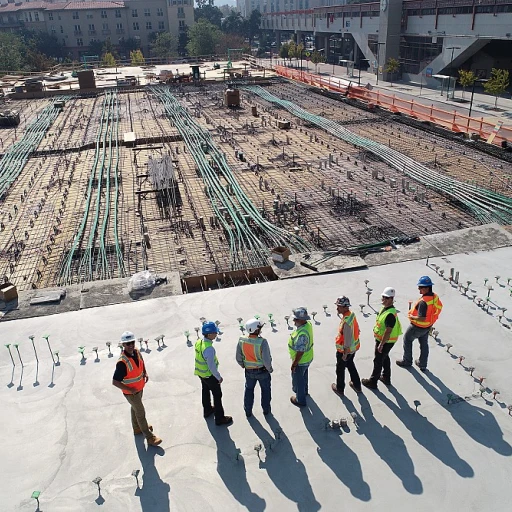
The Complexity of Modern Background Checks
The multifaceted nature of modern background checks represents a complex landscape that can be challenging for both job seekers and employers. Conducting a comprehensive background check is much more than just a simple criminal history verification. It often includes various components such as criminal records, credit reports, employment verification, and verification of academic qualifications.
Employers rely on these checks to ensure the potential employees have the integrity and history they're seeking, making the employment background process crucial. However, the increasing number of areas checked can extend the duration significantly. Some checks, like criminal background checks and credit reports, usually involve the collection of data from multiple sources, which inherently takes time. Furthermore, employment verification can be particularly time-consuming, especially when previous employers are unresponsive or records are hard to find.
Another factor contributing to the complexity is the third-party check companies often utilized by employers. These companies specialize in various aspects of the background screening process, yet their capabilities vary, affecting the speed and completeness of reports. In the instance of credit report errors or outdated information, report correction processes can introduce further time delays.
Business days also play a critical role; the traditional workweek pace does not often align with the immediate demands of hiring. The background check process depends largely on business day operations of those providing necessary information.
Understanding these complexities is essential when looking to optimize or "revamp the background check process." Recognizing common bottlenecks and identifying areas for improvement can help mitigate these delays, which are inherently linked to the vast and intricate nature of modern background checks.
Impact of Technology on Screening Processes
Technological Advances in Background Screening
In recent years, technology has played a pivotal role in transforming the background check process. These advancements aim to speed up the overall screening and reduce the occurrence of errors. However, while technology offers significant benefits, it also comes with its own set of challenges.
Firstly, the integration of new technologies, such as artificial intelligence and machine learning, can help in analyzing vast amounts of data more efficiently. This ensures a thorough examination of criminal records, employment history, and credit reports. However, the transition from traditional methods to tech-driven solutions might initially cause delays. Employers must be cautious about the impact of these innovations on their current systems.
Another area greatly affected by technology is data access. With automated systems, background check companies can now access extensive databases in real-time. This allows for a more comprehensive criminal background and employment verification process. Nevertheless, enhanced access means that companies must comply with strict data privacy regulations to avoid legal complications.
Despite these advancements, check delays still persist. Technological errors, data mismatches, and integration issues are common challenges that need addressing. For instance, inaccuracies in credit or employment background checks can lead to significant time delays. Regular audits and updates can minimize such setbacks and improve accuracy.
Ultimately, leveraging technology effectively can lead to enhanced efficiency and accuracy in background screening. However, it's important for employers to balance tech adoption with thorough checks and regular system evaluations. For a deeper understanding of how these technological trends impact timelines, you can explore more detailed insights in this article.
Regulatory Changes and Their Effects
Regulatory Changes Affecting the Verification Landscape
Understanding the intricacies of regulatory changes is crucial for businesses navigating the modern background check process. Over the years, evolving legal requirements have significantly impacted background checks, influencing everything from employment verification to criminal background screening. These changes are primarily aimed at ensuring fair practices and protecting individuals' rights, but they can also inadvertently result in delays. One of the core elements affected by regulatory changes is the treatment of credit reports in employment background checks. Laws such as the Fair Credit Reporting Act (FCRA) impose strict guidelines on how credit information can be used by employers. Compliance with these regulations requires thorough understanding and careful implementation, often necessitating additional time in the verification process. Criminal records checks are another area where regulatory shifts have introduced complexities. Ban-the-box laws and fair chance hiring initiatives aim to eliminate initial bias against individuals with a criminal history. These laws may require employers to remove criminal background questions from the early stages of the hiring process, adding steps that can lengthen the screening timeframe. To stay abreast of these legal requirements, many employers rely on third-party check companies. These professionals help navigate the labyrinth of regulations and ensure that the background checks they conduct meet all legal standards. However, collaborating with these experts can sometimes contribute to the delays in completing the background check process as they meticulously verify each record and report. Employers can play a proactive role by regularly reviewing and updating their background check policies in line with current regulations. By doing so, they not only enhance their compliance but also help in reducing potential check delays. For a deeper dive into streamlining processes and adhering to regulations, employers may consider exploring revamping their background check process. In conclusion, while regulatory changes aim to protect candidate rights and promote fair hiring, they add layers of complexity to the background screening process. Staying informed and adaptive is key for employers looking to maintain efficient and lawful background checks.Globalization and International Checks
International Challenges in Screening
In the era of globalization, the process of conducting background checks has become more intricate due to the need for international screenings. Employers are now hiring talent across borders, which includes evaluating criminal records, education verifications, and employment background from different countries. This complex requirement is a key factor contributing to prolonged delays in completing background checks. One challenge arises from varying regulations and data protection laws in different countries. For instance, some regions have stringent privacy laws that restrict access to certain types of information, complicating the process of obtaining comprehensive records. Companies must navigate these legal frameworks carefully, often needing to rely on local third-party agencies familiar with the regulatory environment to facilitate checks. Another consideration is the language barrier and differences in documentation standards. Records might not only be in foreign languages but also formatted distinctly compared to what an employer might be accustomed to. This necessitates translating and verifying documents accurately, further extending the time to complete the screening process. Additionally, accessing international databases might not be as seamless as those available domestically, leading to longer waiting periods for receiving the necessary credit report or criminal history. Some countries may have underdeveloped digital infrastructures, causing further hindrances in acquiring electronic records swiftly. Therefore, while international background checks open the door to a diverse talent pool, they also present significant obstacles that can result in delays. Employers, eager to expedite the process, must balance thoroughness with efficiency, ensuring a fair screening process for prospective employees.Common Bottlenecks in the Screening Process
Identifying the Main Issues in the Screening Journey
Background checks have become an indispensable part of the employment process. However, a common concern for many employers is the potential delays that can arise during the screening period. These delays in the background check process can be frustrating, both for the employer and the job applicant. Here, we uncover some of the typical bottlenecks that can lead to longer than expected completion times.- Criminal Records Verification: One of the primary reasons for delays is the verification of criminal records. Due to varying local, state, and federal regulations, accessing this information can sometimes be a slow process. For instance, updating court records on a consistent basis may take more time than anticipated, especially in rural areas.
- Employment and Education Verification: Employment verification is another common hurdle. Contingent on the responsiveness of past employers or educational institutions, the time taken to verify previous job history or educational backgrounds can be extensive. Moreover, institution holidays or limited staffing can exacerbate these delays.
- Credit Reports: For positions requiring a credit report check, employing the Fair Credit Reporting Act guidelines can introduce further delays. While critical for positions related to financial responsibility, ensuring accuracy and compliance can add additional business days to the timeline.
- Third-Party Dependencies: Often, businesses rely on third-party background check companies to furnish accurate screening reports. However, reliance on external services means that any inefficiencies or errors on their end can directly affect the total processing time of the background check.
- Global Background Checks: With globalization, it has become more commonplace for checks to involve international components. International employment verifications and criminal background checks can be particularly time-intensive due to varied regulations and logistical issues inherent to cross-border data access.
Tips for Reducing Background Check Delays
Strategies to Minimize Delays in the Background Screening Process
Navigating the complexities of background checks can be challenging for employers seeking to streamline the hiring process and avoid lengthy delays. Here are several strategies to help reduce the time required to complete background checks:- Work with Reputable Third-Party Companies: Partnering with a reliable background check company can make a significant difference. Experienced screening providers are well-versed in the various facets of the check process, from employment verification to analyzing criminal records, thus speeding up the process effectively.
- Start the Process Early: Initiating background screening at the earliest stage of the hiring practice can prevent long delays. Allowing more business days for the check to be completed reduces pressure and ensures thorough due diligence.
- Ensure Accurate Information Submission: One common cause of check taking longer than expected is the presence of errors in the information provided. Ensuring candidates supply correct details regarding their employment background and personal information can reduce potential setbacks.
- Stay Informed on Regulatory Changes: Keeping abreast of changes in employment screening regulations can help avoid unnecessary compliance issues. Adhering to fair credit practices and updating processes in response to new laws can mitigate unexpected screening delays.
- Utilize Technology Efficiently: Leveraging technology in the screening process enhances efficiency. Automated solutions for records and credit report verification can significantly cut down processing time.
- Communicate Clearly with Candidates: Transparency with job applicants about the procedure and timeline can set realistic expectations. Clear communication can also encourage candidates to promptly provide any additional information or clarification.













